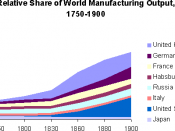Since the beginning of time, humans have been unable to live in ecological balance. No matter where we happen to live on Earth, we eventually outstrip the environment. This has always led to competition as a means of survival, and warfare has been the inevitable consequence of our ecological demographic propensities. And while realizing this the question that came up is whether humans are genetically programmed to be this way. Or do we have the ability to change the fundamental human-environmental relationship that not only has been with us for millions of years but in many ways has made us who we are today.
The human society before the Neolithic Revolution, consisted of small groups of hunters/ gatherers who adapted to their environment and relied on the resources available in their surroundings. Their mobile way of life was suited to the raising of small families, which kept the populations in check and did not put a strain on the earth's environment.
After the Neolithic Revolution, human beings started to live permanently in one place for the first time in their history. The dependence of the communities on small pieces of land for growing food put pressure on the environment. The human population began to expand exponentially since it was now desirable to have more children with agriculture requiring more 'hands' in the fields, thus the onset of environmental degradation began.
The Industrial Revolution was one of the major technological, socioeconomic and cultural changes in the late 18th and early 19th century resulting from the replacement of an economy based on manual labor to one dominated by industry and machine manufacture. It began in Britain with the introduction of steam power and powered machinery. The development of all-metal machine tools in the first two decades of the nineteenth century enabled...


